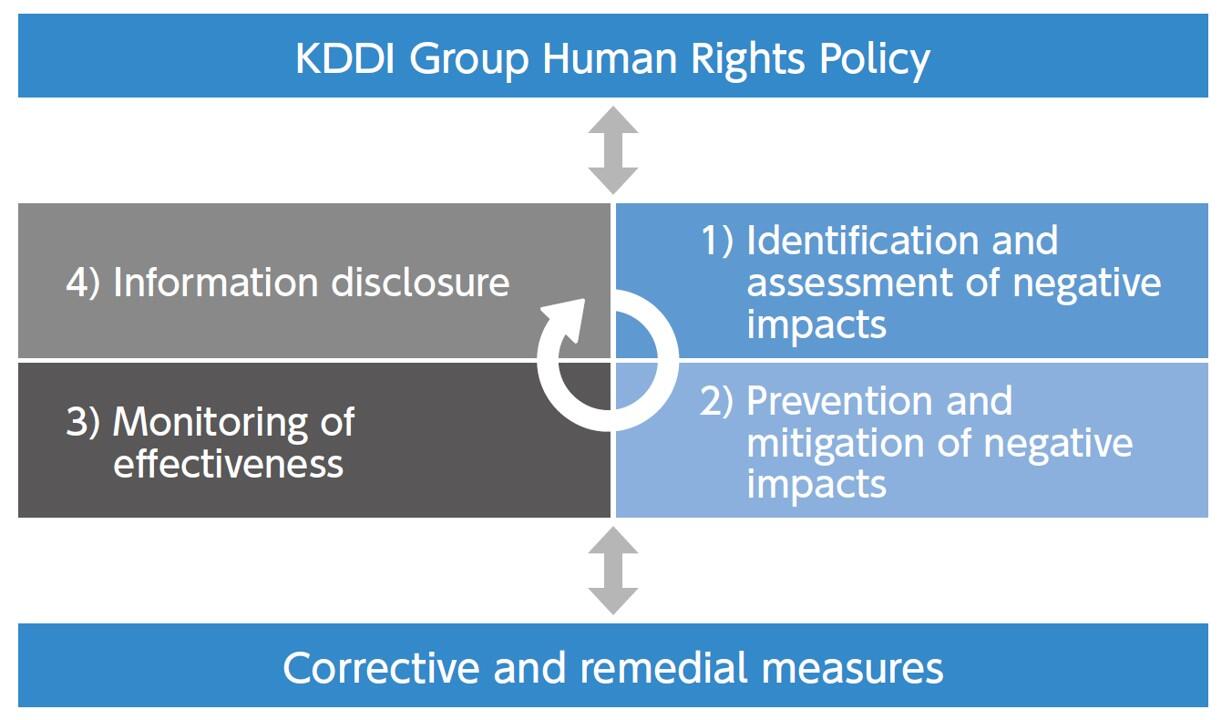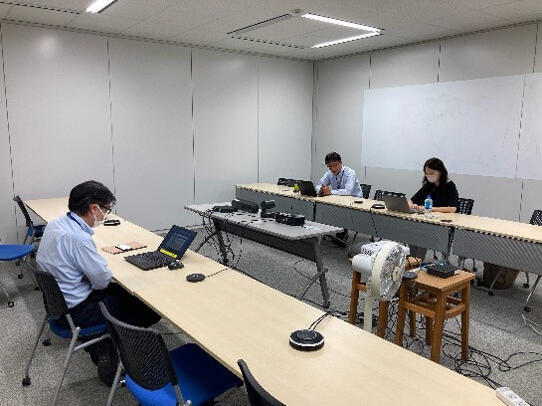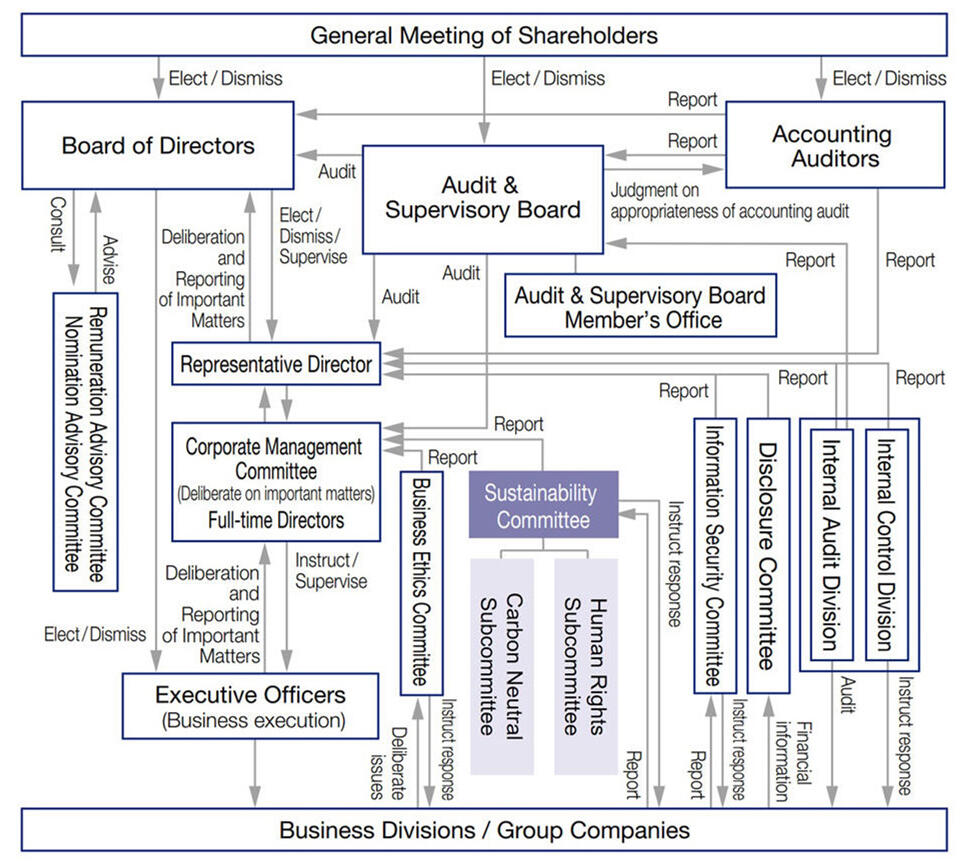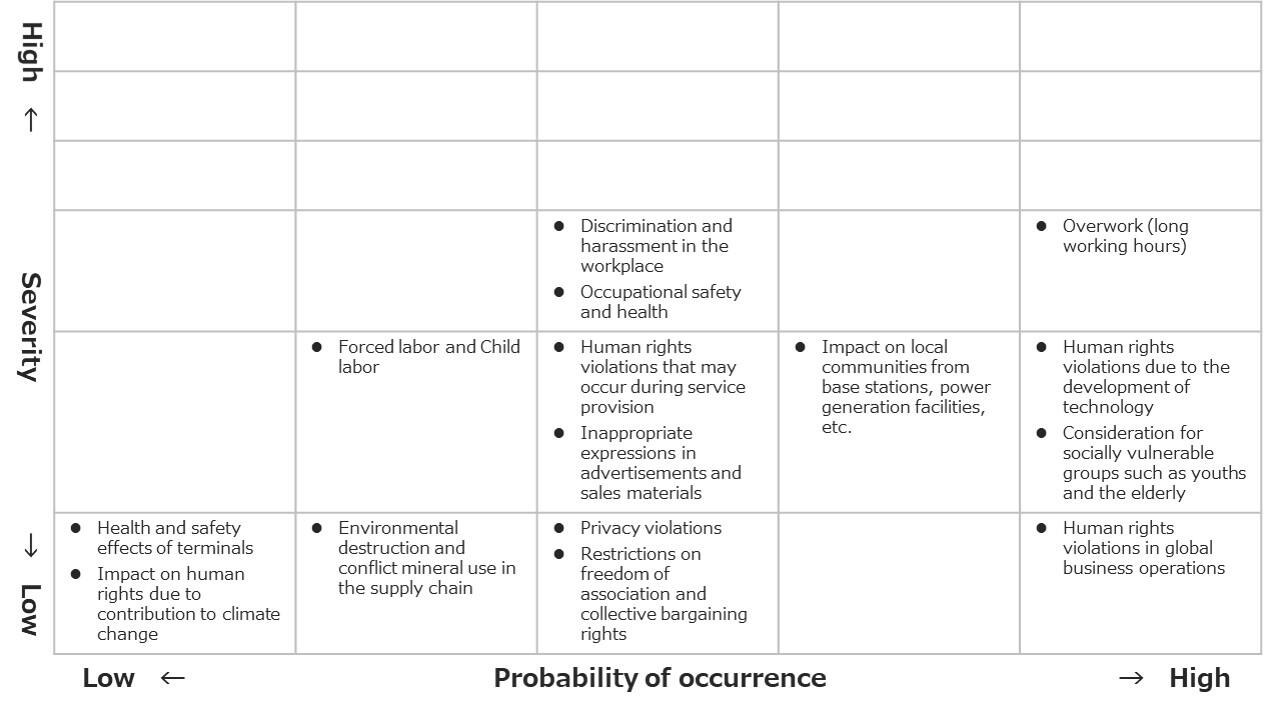- KDDI HOME
 Corporate Information
Corporate Information  Sustainability
Sustainability  Respect for Human Rights
Respect for Human Rights
Respect for Human Rights
KDDI's Approach (Human Rights)
The KDDI Group recognizes that all of our business activities are premised on respect for human rights. We believe that we have a responsibility to respect the human rights of our employees, business partners, and all other stakeholders involved in our business activities, as well as to prevent and mitigate human rights violations.
In July 2022, KDDI joined the United Nations Global Compact. Under the top management commitment, we will work on respecting human rights in our business activities.
We are striving to avoid discrimination based on race, faith, gender, social status, religion, nationality, age, sexual orientation, gender identity, mental / physical disabilities, pregnancy, child birth as well as tackling and eliminating labor practices that violate human rights, such as forced labor and child labor.
We have set a zero-tolerance approach as the core of our initiatives. The KDDI Group considers the International Bill of Human Rights and the International Labor Organization (ILO) Declaration on Fundamental Principles and Rights at Work to be the most fundamental policies for human rights and set the policies and take initiatives based on the UN Guiding Principles on Business and Human Rights and the OECD Guidelines for Multinational Enterprises.
The KDDI Code of Business Conduct, which serves as a guideline for behavior of officers and employees, defines our basic principles on respecting human rights and individual characteristics throughout all our business activities.
We believe that diversity, equity and inclusion is important for a company to achieve sustainable growth, especially in driving innovation. The KDDI Group Philosophy includes a vision of embracing diversity to facilitate the understanding. We are also aware that issues surrounding the privacy protection and human rights violations due to technological advancement uniquely expose the telecommunication industry to human rights risks. We are determined to fulfill our social responsibility to address these issues by leading an industry-wide drive by means of continuous stakeholder engagement for risk identification.
KDDI Group Human Rights Policy
In order to fulfill our responsibility to respect human rights and further accelerate our efforts, the KDDI Group revised the KDDI Group Human Rights Policy in October 2022. This policy was discussed and approved by the Corporate Management Committee and the Board of Directors.
In light of the increasing momentum in the demand for companies to take responsibility for respecting human rights, the revised policy clearly stipulates compliance with international laws and regulations, the continuous implementation of human rights due diligence, and dialogue with stakeholders.
In accordance with this policy, all Group employees will respect international standards such as the Universal Declaration of Human Rights and are committed to respecting human rights in accordance with the UN Guiding Principles on Business and Human Rights.
Furthermore, we will strive to protect the human rights of all stakeholders, including employees, customers, and business partners, and contribute to the achievement of a truly connected society.
Management Framework
At the Sustainability Committee (which convenes twice a year) chaired by the President, KDDI determines the policy on activities related to human rights, develops and reviews the promotion structure, and checks the activities' progress against targets. We will work on respecting human rights under the top management commitment.
We have also set up the Human Rights Subcommittee (which convenes twice a year) under the Sustainability Committee. The Subcommittee functions as an organization to propose and discuss the human rights issues of the entire KDDI Group and is headed by the General Manager of the Sustainability Management Division.
The participants include the General Administration Division, Human Resources Division, Procurement Division, and other related business divisions.
Based on the "KDDI Group Human Rights Policy," we will hold discussions on the promotion of respect for human rights, conduct human rights due diligence, and study measures to address human rights issues, in order to promote Group-wide efforts to respect human rights.
Organizational Structure
Human Rights Due Diligence
The KDDI Group has conducted human rights due diligence in accordance with the UN Guiding Principles on Business and Human Rights. In the initiatives, we have identified the human rights issues that global companies are expected to address and have reflected them when considering measures.
We will continue to comply with this policy, and examine and implement measures through the human rights due diligence mechanism in cooperation with related divisions.

Human Rights Impact Assessment
In fiscal 2022, we conducted a human rights impact assessment, with the guidance of external experts, targeting our own employees, women, children, and local communities, in the context of our business activities and value chain. Based on the results, we created a human rights risk mapping and further identified critical human rights issues within the KDDI Group. The "KDDI Group Human Rights Policy" also explicitly states critical human rights issues.
■Human Rights Risk Mapping
■Critical Human Rights Issues
| 1 | Pursue the well-being of our employees and promotion of diversity, equity and inclusion | Prohibition of discrimination and harassment |
|---|---|---|
| Establishment of a safe and comfortable working environment | ||
| Prohibition of forced labor and child labor | ||
| Respect for freedom of association and the right to collective bargaining | ||
| 2 | Ethical utilization of technology and data to support innovation | Avoidance of human rights violations arising from technological advancements |
| Respect for privacy protection and freedom of expression | ||
| 3 | Provision of human rights-respecting services and products | Respect for human rights in the provision of services and products |
| Realization of user-friendly services and products for everyone | ||
| Harmony with the local community and elimination of human rights violations in the supply chain | ||
| Avoidance of adverse human rights impacts due to climate change progression |
Remediation: Grievance Mechanism
KDDI has established a contact point to receive consultations and reports from a wide range of stakeholders in order to reduce and prevent adverse effects on human rights from its business activities and to promote respect for human rights.
In the unlikely event that a case of human rights violation is found to have occurred, we have a system in place to respond promptly and sincerely.
We established the Business Ethics Helpline to receive consultations or reports concerning ethical violations, including human rights issues and legal compliance, targeting KDDI employees and employees of KDDI Group companies. We also set up the Sexual Harassment and Human Relationships Hotline staffed by external professional counselors. Concerning the 'Business Ethics Helpline,' we accept consultations and reports through both an internal and an external contact point, in collaboration with external experts, and we are always available via email and phone calls, offering support in multiple languages.
Furthermore, we have established the "Employee Counseling Center," which is staffed by employee counselors to address workplace issues and concerns, and the "Harassment Hotline" operated by employees in the Human Resources division. Additionally, we have established a "Supplier Helpline" as a consultation point for employees and business partners of KDDI and KDDI Group companies. We encourage the understanding and implementation of the "KDDI Group Sustainable and Responsible Procurement Guidelines," which explicitly outline the prohibition of forced labor, inhumane treatment, child labor, and discrimination, among other principles, for our business partners.
Any stakeholder can discuss or report their concerns. Privacy of those reporting concerns is protected at any contact point.In accordance with the Whistleblower Protection Act, we ensure the confidentiality of those who consult with us and report to us and make every effort to protect them so that they will not be treated unfairly because they have consulted with us or have reported something to us.
If it is identified that its business activities has caused, or had any adverse impact on human rights, KDDI ensures that it will provide relief for those affected.
Employee Awareness Raising
KDDI and our group companies in Japan strive to further raise awareness of human rights based on the KDDI Group Human Rights Policy and KDDI Code of Business Conduct in director trainings, new employee trainings and position-based compliance trainings. KDDI conducts awareness-raising initiatives, including e-learning training on business and human rights, seminars on harassment prevention (targeted at all managers), and the publication of the "Harassment Prevention Guidebook" on the intranet.

Harassment Prevention Guidebook

Training by Teams
Improvement of Human Rights Risks
In fiscal 2022, we took remedial and corrective measures for a single case of harassment that occurred.
The steps are as follows.
- An investigation of the facts to ensure no disadvantage to victims.
- Psychological support was provided to victims of harassment through counseling by the Work Style Reform & Health Management Department.
Youth Education Activities
- Society
-
- Respect for Human Rights
- Supply Chain Management
- DE&I (Diversity, Equity and Inclusion)
- Human Resources
- Community Cooperation (in Japanese only)
- Awareness Raising and Education
- Safer and More Resilient Connected World
- Cyber Security and Privacy Protection
- Responsibility for Products and Services
- Innovation Management
- Customer Relationship Management
- Brand Management
- Initiatives outside Japan
- Stakeholder Engagement
- ESG Data (Social)
- Recommended Contents
-





